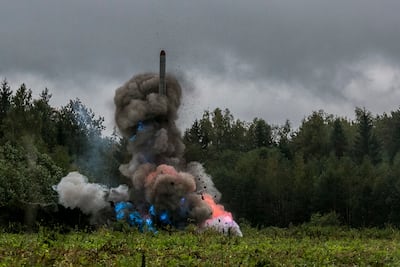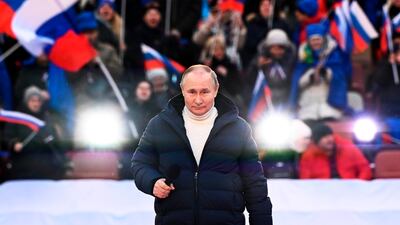President Vladimir Putin's threats of a nuclear strike have not been backed up by the weapons being sent to Russia's battlefield forces in Ukraine, according to defence experts .
Three days after the invasion, the Russian leader announced that his “deterrence” nuclear forces were to be placed on a “special mode of combat duty” as a means of deterring Nato’s direct involvement in Ukraine.
While Russia has a large arsenal of intercontinental ballistic missiles on constant high alert, there is no intelligence to show its tactical weapons are on a newly special footing, said Pavel Podvig, head of the Russian nuclear forces project at the Chatham House think tank
“It appears that there was nothing there that would indicate a really heightened state of alert,” he said. “There are no Iskander missiles roaming around with nuclear warheads and there are no aircraft sitting on tarmac ready to take off.”
If Russia were to fire a nuclear weapon, it would probably use one of the vehicle-mounted Iskander-M missiles that is capable of firing a 50-kiloton warhead at a target up to 500 kilometres away.
But the weapon would have to be armed first, requiring the Strategic Missile Forces to open special ammunition bunkers to retrieve the weapon, potentially alerting western intelligence.
To date, it appears that there are no “visible steps” of weapons being removed, Dr Podvig told a Chatham House webinar.
“As I understand it, that hasn't been done. There is no nuclear button on the table that someone could push and order a launch.”

He suggested Mr Putin’s messaging had been “largely political” to deter Nato involvement.
But a Kremlin-backed television station carried a comment on Tuesday from its regular contributor Igor Korotchenko, who urged commanders to arm units with tactical nuclear weapons in response to a trade blockade.
“What should be Russia’s response? Tactical nuclear weapons as battlefield weapons. Clearly, two brigades of the Iskander missiles should be equipped with special munitions.”
In response, Nato Secretary General Jens Stoltenberg has stated that Russia should “stop this dangerous, irresponsible nuclear rhetoric”.
“Let there be no doubt about our readiness to protect and defend allies against any threat anytime … Russia must understand that it can never win a nuclear war,” he told reporters before a Nato leaders' summit in Brussels, Belgium.
Sir Lawrence Freedman, a respected military strategist, told Chatham House that if Mr Putin faced “humiliation and embarrassment” in Ukraine, “he doesn't have that many options”.
It was difficult to understand Mr Putin’s state of mind and “his grasp of the situation that he's put his country into and how determined he would be to avoid that humiliation”.
He added that despite being devastating, nuclear weapons are “not game-changing … not least because it's hard to contain their effects when you've got forces close to each other".
Dr Podvig agreed that Mr Putin’s rationality was questionable — meaning that there is “a chance, however small, of this escalating into really serious nuclear exchange”.












































